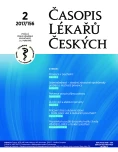-
Medical journals
- Career
Prevention of eating disorders
Authors: Hana Papežová
Authors‘ workplace: Centrum pro poruchy příjmu potravy, Psychiatrická klinika 1. LF UK a VFN v Praze
Published in: Čas. Lék. čes. 2017; 156: 68-76
Category: Review Article
Overview
The quality of the prevention of eating disorders represents in several last decades frequently discussed issue in the context of rapidly changing socio-economic conditions, a significant increase of influence of the media, new technologies and knowledge of risk factors. Primary prevention aims to reduce the risk of developing eating disorders, but secondary and tertiary prevention play the important role as well. Effective and coordinated prevention is still missing. Our experience of international cooperation of the last 20 years led to the development and evaluation of prevention programs. We are describing their fast development and ongoing programs following the new trends recommended by WHO.
Keywords:
eating disorders, new trends in prevention
Sources
1. Pavlová B, Uher R, Papežová H. It would not have happened to me at home: qualitative exploration sojourns abroad and eating disorders in young Czech women. Eur Eat Disord Rev 2008; 16(3): 207–214.
2. Pavlová B, Uher R, Dragomirecka E, Papežová H. Trends in hospital admissions for eating disorders in a country undergoing a socio-cultural transition, the Czech Republic 1981–2005. Soc Psychiatry Psychiatr Epidemiol 2010; 45(5): 541–550.
3. Franko DL. Integrating risk factor research into eating disorders prevention for adolescents and young adults. Presentation at the 1st Charles University, Prague, Czech Republic, May 2003.
4. Cuijpers P. Examining the effects of prevention program on the incidence of new CASE of mental disorders: the lack of statistical power. Am J Psychiatry 2003; 160 : 1385–1391.
5. Miovský M. Vývoj národního systému školské prevence rizikového chování v České republice: Reflexe výsledků 15letého procesu tvorby. Adiktologie 2015; 15(1): 62–87.
6. Bryant-Waugh R, Turner H, East P, Gamble C. Developing a parenting skills-and-support intervention for mothers with eating disorders and pre-school children Part 1: Qualitative investigation of issues to include. Eur Eat Disord Rev 2007; 15(5): 350–356.
7. Papežová H. Ženy s poruchou příjmu potravy a těhotenství. Zpravodaj Klubu Levret 2003; 12 : 26–29.
8. Norré J. The eating disorders patient as a parent. Čes a slov Psychiat 2007; Suppl.1 : 30–32.
9. Uhlíková P, Papežová H, Malá E et al. Asistovaná reprodukce u pacientek s poruchou příjmu potravy – klinické a etické aspekty. Česká gynekologie 2006; 71(4): 339–341.
10. Šmahel D. Co dělají čeští dospívající na internetu. Psychologie dnes 2004; 10(7/8): 32–34.
11. Housová J, Haluzík M. Vliv prostředí sportovní školy na rozvoj a udržování poruch příjmu potravy (kazuistiky). Čs a Slov Psychiat 2005; 101(Suppl.1): 40–41.
12. Papežová H. Rizikové chování v oblasti stravování. In: Kabíček P, Csémy L, Hamanová J et al. Rizikové chování v dospívání a jeho vztah ke zdraví. Triton, Praha, 2014 : 315–328.
13. Kordy H, Krämer B, Palmer RL et al. Remission, recovery, relapse and recurrence in eating disorders: conceptualization and illustration of a validation strategy. J Clin Psychol 2002; 58 : 833–846.
14. Tobler NS, Stratton HH. Effectiveness of school-based drug prevention programs: A meta-analysis of the research. J Prim Prev 1997; 18(1): 71–128.
15. Golan M, Crow S. Patients are key players in the prevention and treatment of weight-related problems. Nutr Rev 2004; 62(1): 39–51.
16. Papežová H. Anorexia nervosa: příručka pro všechny, kteří nemocí trpí – postižené samotné, jejich rodiny, přátele, partnery a některé odborníky (učitele a lékaře první linie). PCP, Praha, 2000.
17. Papežová H, Hanusová J. Poruchy příjmu potravy: příručka pro pomáhající profese. Togga, Praha, 2012. Dostupné na: www.proyouth.eu/csfiles/prirucka-pro-skolni-praxi.pdf
18. NEDA Toolkit for Educator. Dostupné na: www.healthyandfree.cz/index.php/ucitel
19. Kohl LF, Crutzen R, de Vries NK. Online prevention aimed at lifestyle behaviors: a systematic review of reviews. J Med Internet Res 2013; 15(7): 71–83.
20. World Health Organization. Mental health action plan 2013 – 2020. WHO, Geneva, 2013, s. 48. Dostupné na http://apps.who.int/iris/bitstream/10665/89966/1/9789241506021_eng.pdf?ua=1
21. Hanusová J, Štěpánková T, Tomanová J et al. Online prevention and early intervention in the field of psychiatry using gamification in internet interventions: Practical experience with a program targeting eating disorders in Czech Republic. In: Novák D, Tulu B, Brendryen H (eds.). Handbook of Research on Holistic Perspectives in Gamification for Clinical Practice. IGI Global, 2016 : 358–389.
Labels
Addictology Allergology and clinical immunology Angiology Audiology Clinical biochemistry Dermatology & STDs Paediatric gastroenterology Paediatric surgery Paediatric cardiology Paediatric neurology Paediatric ENT Paediatric psychiatry Paediatric rheumatology Diabetology Pharmacy Vascular surgery Pain management Dental Hygienist
Article was published inJournal of Czech Physicians

-
All articles in this issue
- Prevention in psychiatry
- Suicide − a serious health and social problem with the possibility of prevention
- Prevention of eating disorders
- Life style and affective disorders
- Work-related stress and mental health – can work lead to mental disorders?
- A note on application of the WHOQOL-BREF questionnaire on quality of life in the Czech enviroment
- Journal of Czech Physicians
- Journal archive
- Current issue
- Online only
- About the journal
Most read in this issue- A note on application of the WHOQOL-BREF questionnaire on quality of life in the Czech enviroment
- Work-related stress and mental health – can work lead to mental disorders?
- Suicide − a serious health and social problem with the possibility of prevention
- Prevention of eating disorders
Login#ADS_BOTTOM_SCRIPTS#Forgotten passwordEnter the email address that you registered with. We will send you instructions on how to set a new password.
- Career

